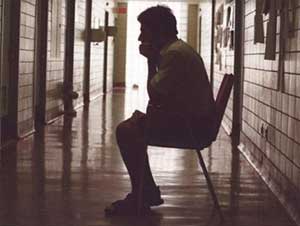 |
A test subject participating in the trial at Douglas Hospital in Montreal, Canada (Photo: TTO) |
Recently, the story of a drug trial for leukemia and scleroderma treatment known as TGN 1412 in London has shocked public opinion due to its dangerous overdose…
He looked like a human – elephant
At Northwick Park Hospital in London, just minutes after eight “human guinea pigs” received their injections, an incident occurred. This was the first human trial for the drug TGN 1412 aimed at combating leukemia and scleroderma. It remains unclear where the malfunction occurred, but six individuals who received the actual drug began to “transform.”
Recalling the incident, Raste Khan – one of two participants who received the placebo (a substance with no therapeutic effect, often used in clinical trials), was still trembling as he spoke: “The person sitting next to me was vomiting uncontrollably. He collapsed. He looked like he was in severe pain. Following him, the other five fell one after another like dominoes. Everyone was vomiting. One person was screaming that he had a terrible headache and couldn’t breathe.” Myfanwy Marshall, a girl who also received the placebo, still pale with fear, said: “I nearly fainted when I saw the person next to me. He looked like a human – elephant, his head was swollen three times its normal size, and his legs were also swollen. His face kept changing between purple and yellow.”
Prosecutor Ann Alexander expressed doubts about the drug, questioning whether it had been successfully tested on animals before human trials commenced: a representative of TeGenero revealed in a conversation with a family that a dog had died during the testing process. However, TeGenero did not directly conduct the trials, delegating the task to Parexel, an American company. Prosecutor Ann Alexander raised the issue of investigating the incident.
Young Participants…
To gather enough “test subjects,” companies post small advertisements or enticing messages on the Internet. The targeted demographic is students who are always eager to earn some extra money to cover the increasingly expensive cost of education.
According to journalist Tom de Castella from The Guardian, Parexel continuously advertised via SMS offering a sum equivalent to £1,300 (about $1,800) for participating as “guinea pigs” for three days and $2,000 for a week. In addition to students, drug addicts and immigrants from third countries were also among those targeted by the messaging.
“They are very happy to stay in the hospital for a week as test subjects to walk away with a significant amount of money to pay for college or to buy a computer or go skiing in the winter,” explained journalist Tom de Castella. In the Parexel case, each “human guinea pig” was promised an equivalent of $4,600.
In this failed experiment, Raste Khan and the others were all students. He admitted he signed up for the money: “I wanted to maximize my time for university without having to share it with part-time jobs. But this is just not worth it.”
Currently in the UK, there are about 350 human trials conducted annually in Phase 1 (on a small group) and are often contracted out to private laboratories, as was the case with Parexel for the TGN 1412 drug.
TH.TÙNG (The Guardian, Le Soleil)

















































